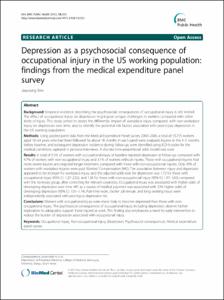KUMEL Repository
1. Journal Papers (연구논문)
1. School of Medicine (의과대학)
Dept. of Preventive Medicine (예방의학)
Depression as a psychosocial consequence of occupational injury in the US working population: findings from the medical expenditure panel survey
- Keimyung Author(s)
- Kim, Jae Young
- Department
- Dept. of Preventive Medicine (예방의학)
- Journal Title
- BMC Public Health
- Issued Date
- 2013
- Volume
- 13
- Issue
- 1
- Abstract
- BACKGROUND:
Empirical evidence describing the psychosocial consequences of occupational injury is still limited. The effect of occupational injury on depression might pose unique challenges in workers compared with other kinds of injury. This study aimed to assess the differential impact of workplace injury compared with non-workplace injury on depression over time, and to identify the potential risk factors associated with post-injury depression in the US working population.
METHODS:
Using pooled panel data from the Medical Expenditure Panel Survey 2000-2006, a total of 35,155 workers aged 18-64 years who had been followed for about 18 months in each panel were analyzed. Injuries in the 4-5 months before baseline, and subsequent depression incidence during follow-up, were identified using ICD-9 codes for the medical conditions captured in personal interviews. A discrete time-proportional odds model was used.
RESULTS:
A total of 5.5% of workers with occupational injury at baseline reported depression at follow-up, compared with 4.7% of workers with non-occupational injury and 3.1% of workers without injuries. Those with occupational injuries had more severe injuries and required longer treatment, compared with those with non-occupational injuries. Only 39% of workers with workplace injuries were paid Workers' Compensation (WC). The association between injury and depression appeared to be stronger for workplace injury, and the adjusted odds ratio for depression was 1.72 for those with occupational injury (95% CI: 1.27-2.32), and 1.36 for those with non-occupational injury (95% CI: 1.07-1.65) compared with the no-injury group, after controlling for relevant covariates. Occupational injury was associated with higher odds of developing depression over time. WC as a source of medical payment was associated with 33% higher odds of developing depression (95% CI: 1.01-1.74). Part-time work, shorter job tenure, and long working hours were independently associated with post-injury depression risk.
CONCLUSIONS:
Workers with occupational injury were more likely to become depressed than those with non-occupational injury. The psychosocial consequences of occupational injury, including depression, deserve further exploration to adequately support those injured at work. This finding also emphasizes a need for early intervention to reduce the burden of depression associated with occupational injury.
- Keimyung Author(s)(Kor)
- 김재영
- Publisher
- School of Medicine
- Citation
- Jaeyoung Kim. (2013). Depression as a psychosocial consequence of occupational injury in the US working population: findings from the medical expenditure panel
survey. BMC Public Health, 13(1), 303–303. doi: 10.1186/1471-2458-13-303
- Type
- Article
- ISSN
- 1471-2458
- Appears in Collections:
- 1. School of Medicine (의과대학) > Dept. of Preventive Medicine (예방의학)
- 파일 목록
-
-
Download
 oak-aaa-00675.pdf
기타 데이터 / 289.25 kB / Adobe PDF
oak-aaa-00675.pdf
기타 데이터 / 289.25 kB / Adobe PDF
-
Items in Repository are protected by copyright, with all rights reserved, unless otherwise indicated.